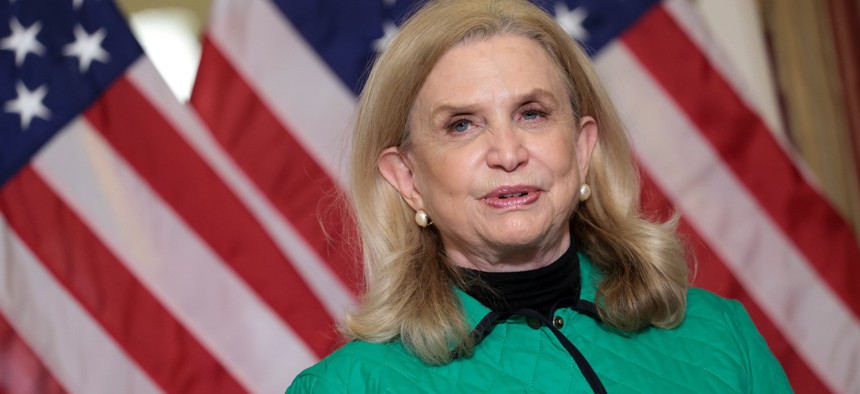
Rep. Carolyn Maloney, D-N.Y., chairwoman of the House Oversight and Reform Committee, introduced the bill. Kevin Dietsch/Getty Images
Lawmakers Want to Improve Federal Agencies’ Financial Management
New bill would build on a 1990 law.
A new bill looks to improve federal agencies’ financial management––a persistent issue across the government, according to a watchdog.
Rep. Carolyn Maloney, D- N.Y., chair of the House Oversight and Reform Committee, introduced the 2022 CFO Vision Act on Friday. It would update the 1990 Chief Financial Officers Act, which—among other major reforms—gave the Office of Management and Budget more authority over agency book-keeping. Sen. Mark Warner, D-Va., will be introducing a companion version of the new bill in the Senate in the coming weeks.
“The Chief Financial Officers Act of 1990 envisioned a future where a governmentwide integrated system could provide decision makers with financial and performance data that was complete, reliable, timely and consistent,” said a fact-sheet from the office of Rep. Carolyn Maloney, D-N.Y., chair of the House Oversight and Reform Committee. “Since the law was passed more than 30 years ago, the government has made substantial progress, but enhancements are needed to ensure sustained improvement.”
The bill would standardize the responsibilities for CFOs across the federal government; give sufficient authority to deputy CFOs to mitigate the impact of CFO vacancies and turnover; require OMB to develop broader performance-based metrics for financial management; and strengthen agencies’ internal controls. It would also revise requirements for financial management planning.
Currently, OMB is required annually to issue a five-year financial management plan, but it has not done so since 2009, so this bill would replace “the five-year plan with a requirement for governmentwide and agency-level plans issued at least every four years along with other performance reporting requirements,” said the fact-sheet.
During the last session of Congress, the late Sen. Mike Enzi, R-Wyo., introduced the bill and the Senate passed it by unanimous consent. A diverse coalition of 12 organizations endorsed it at the time.
“Financial management issues exist and persist across [the] government,” said their statement. “In March 2019, the Government Accountability Office reported that it once again could not render an opinion on the U.S. government’s annual financial statements, noting ‘problems with DoD’s financial management and auditability, the federal government’s inability to account for transactions between agencies, and weaknesses in the process for preparing the consolidated financial statements.’ ” The CFO Vision Act “would tackle many of these problems,” the coalition stated.
GAO also could not issue a decision on the government’s financial statements for fiscal 2020 and 2021. There has been “significant progress” by the federal government overall in its financial management since the CFO Act was passed, said GAO in a report last month. “But significant challenges remain to realizing the intended financial management reforms of the act.”







